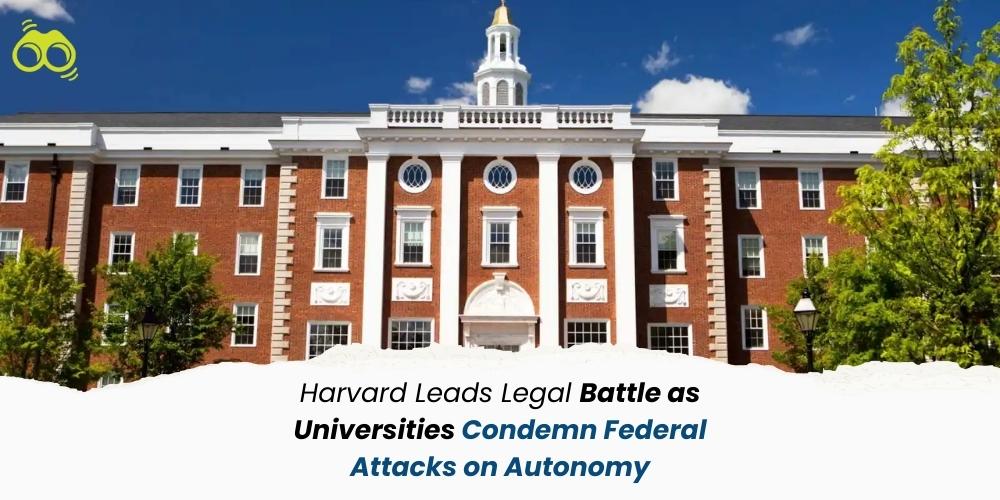Higher Education Leaders Rally Against Threats to Institutional Independence
AAC&U Issues Joint Statement Condemning Federal Intrusions in U.S. Universities
More than 150 U.S. college and university presidents reportedly signed a joint statement criticising what they described as the Trump administration’s unprecedented interference in higher education. Released by the American Association of Colleges and Universities (AAC&U), the statement expressed unified opposition to perceived political overreach and emphasised the importance of maintaining institutional independence.
Leaders from various prominent universities, including Harvard, Princeton, and Brown, reportedly stated their openness to constructive reform but rejected what they considered excessive government intrusion into campus affairs. This collective stance followed a lawsuit filed by Harvard against the administration after it allegedly threatened to revoke the university’s tax-exempt status and freeze $2.3 billion in federal funding due to its handling of campus protests. Together, the lawsuit and the joint statement appeared to mark a shift toward more assertive resistance from universities, which had initially responded cautiously.
It was further noted that university leaders issued their first formal collective statement during a meeting spearheaded by the AAC&U and the American Academy of Arts and Sciences. Lynn Pasquerella, President of the AAC&U, reportedly explained that over 100 university leaders had agreed on the urgency of taking a united stance. She attributed the delayed response to the administration's “flood-the-zone” strategy, which allegedly overwhelmed institutions with a constant flow of directives, policies, and executive orders. Pasquerella also pointed out that internal pressures from boards and stakeholders with conflicting priorities contributed to the hesitancy.
The Trump administration has been accused of targeting universities through measures framed as efforts to combat antisemitism or dismantle diversity initiatives. These actions reportedly included threats to billions in federal funding unless universities complied with specific conditions, such as transferring academic departments from faculty oversight or assisting federal monitoring of international students. Prestigious institutions like Harvard, Cornell, Northwestern, Brown, Columbia, Princeton, and the University of Pennsylvania were said to have faced funding cuts or threats.
Reports indicated that Columbia University complied with some of the administration’s demands to restore funding, including placing an academic department under external oversight. However, signatories of the joint statement warned that such interventions disrupted academic research, undermined long-standing federal-university collaborations, and created a repressive environment. They emphasised the necessity of preserving universities as spaces for open inquiry, where diverse viewpoints could thrive without fear of censorship or retaliation.
Harvard University strongly opposed these measures, with President Alan Garber asserting that the institution would not relinquish its independence or constitutional rights. This declaration reportedly heightened tensions between Harvard and the White House. Although Harvard initiated the first lawsuit from a university, various faculty groups and higher education associations have since filed additional legal challenges.
Faculty members across multiple institutions, including the Big Ten Academic Alliance, have begun organising efforts to protect academic freedom, with some reportedly adopting a “mutual defence compact.” During an AAC&U meeting, approximately 120 university leaders reportedly discussed potential next steps, such as engaging communities and business leaders to rally support for higher education. Pasquerella emphasised that the joint statement was only the starting point, with the intent of drawing public attention to the dangers of continued government interference in academia. The collective action by university leaders signals a growing determination to safeguard the independence and core values of higher education.
Editor's Note
The united stance taken by over 150 U.S. college and university presidents against political interference in higher education is a critical moment in preserving the autonomy and integrity of academia. This bold move signifies a long-overdue pushback against policies that threaten the foundational principles of open inquiry, academic freedom, and institutional independence. The inclusion of prestigious universities such as Harvard and Princeton in this collective action speaks to the gravity of the situation and highlights a shared determination to protect the sanctity of education from undue political influence. However, the challenges facing higher education remain multifaceted. From targeted funding threats to overreaching directives, institutions are navigating a complex landscape compounded by internal and external pressures. This public and unified response represents a significant step forward in reclaiming higher education as a space for independent thought and democratic values.
Skoobuzz underlines that it is a call to action for all stakeholders to support academia in its mission to foster innovation, inclusion, and progress.














0 Comments (Please Login To Continue)